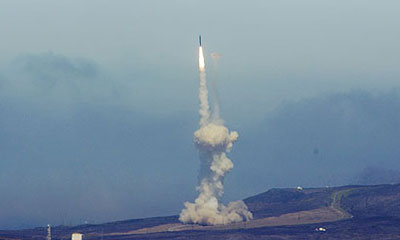
PRAGUE -- As if the Bush administration didn’t have its hands full already with the “war on terror” spiraling out of control in Iraq and even Afghanistan, and talk of Iran being the next target, U.S. plans to base parts of its anti-missile shield system in former Warsaw Pact nations Poland and the Czech Republic is threatening to rekindle the Cold War.
Under the proposal, the Czechs would house the radar system and the Poles the silos with 10 rockets to shoot down missiles fired from “rogue regimes” like Iran and North Korea. The United States already has missile interceptor sites in California and Alaska.
Russia, however, fears the system could be aimed at them.
Russian President Vladimir Putin says the proposal is further proof of the United States’ “increasing disregard for the fundamental principles of international law.” Putin has accused Washington of trying to reignite the global arms race.
General Yuri Baluyevsky, Russian army chief of staff, speculated publicly about whether to withdraw from the 1987 Intermediate-Range Nuclear Forces treaty, which had led to the disarmament of medium-range missiles. General Nikolai Solovtsov, commander of Russia’s missiles forces, has said Russian missiles could be aimed at the Czech Republic and Poland if they agree with the U.S. plan.
Russia is also planning to spend $189 billion to beef up its military. Defense Minister Sergei Ivanov has announced plans for drastic increases in the number of ballistic missiles, nuclear submarines and aircraft carriers. The Russians also plan to quadruple the number of Topol-M missiles.
In the West, the saber-rattling talk from Putin and his military illustrates that it is Putin’s Russia that is looking for conflict. Putin is viewed as a growing autocrat bent on using all means possible, namely oil and natural gas, to regain influence in the former Soviet empire and Western Europe.
However, the U.S. decision to base parts of its anti-missile system is another sign of waning Russian influence in its former empire and how Washington is creeping closer. NATO has gobbled up much of Eastern Europe and even the former Baltic Soviet republics of Latvia, Lithuania and Estonia, putting this U.S.-dominated military club right on Russia’s border. Ukraine and Georgia could join NATO in the future. U.S. military forces are in other former Soviet republics, including, Kyrgyzstan, Uzbekistan, and Azerbaijan. Russia finds itself increasingly encircled, hence the paranoid over the anti-missile shield.
Russia wants Washington to promise in writing that the missile system is not aimed at its country, according to a Feb. 6 Interfax report.
“The Russians say, ‘This is my backyard. You need our cooperation.’ They are right. You cannot stop Iran or contain Iran without Russia. You need the Russians on board,” Andrew Brookes, a space technology expert at London’s International Institute for Strategic Studies, told the AFP news agency on Jan. 26.
Russian objections may be the strongest, but they are not the only ones.
German Foreign Minister Frank-Walter Steinmeier and Defense Minister Franz Josef Jung have criticized the US for failing to discuss the plans with Moscow. Iran didn't possess any intercontinental rockets that could reach the United States, Steinmeier added.
Opposition to the project is strong in both Poland and the Czech Republic. But it appears the governments in Warsaw and Prague aren’t listening. Prime Minister Mirek Topolanek and his Polish counterpart Jaroslaw Kaczynski have said they back the proposal. Ironically, the hostile reaction from Moscow has probably tipped more pols and the public into the pro-camp.
The leader of the Czech opposition Social Democrats, Jiri Paroubek has backed off from calls for a referendum after “being leaned on,” by U.S. officials in Prague, according to the London Guardian.
Lost in the whole debate is whether, militarily at least, there is any point to building a radar station in the Czech Republic. According to Bruno Gruselle, a researcher at the Paris-based Strategic Research Foundation, “the U.S. military already has radar stations in Norway, in Greenland, and in Britain—on top of its Defense Support System satellite alert system—which permit the early detection of missiles, wherever they come from.”
Perhaps the U.S. goal is more political than military. In his 1997 book, The Grand Chessboard, former U.S. National Security Advisor Zbigniew Brzezinski wrote that maintaining U.S. primacy would require Washington “to prevent collusion and maintain security dependence among the vassals, to keep tributaries pliant and protected, and to prevent the barbarians from coming together.”
None of the vassals here in “New Europe” are making any mention of that.











